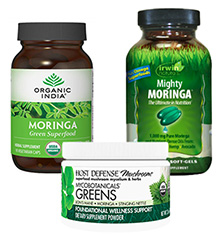Moringa: A Superfood with Well-Deserved Hype
Moringa: A Superfood with Well-Deserved Hype
If there were an entry in the encyclopedia for Superfood, it would undoubtedly have a photo of the subject of this newsletter. Moringa has been trending for several years and its hype is well-deserved. Generally lumped into the Green Foods category along with spirulina and barley grass, moringa has decidedly more “going on” than its fellows in that category.
What Is It?

Moringa oleifera is an evergreen plant native to India but also found widely across Africa and Asia in tropical and subtropical climates. It has been cultivated for centuries for its medicinal properties. Generally the leaves are used, although the bark, roots, seeds, fruit, flowers, and pods are all edible. It has many nicknames, including “drumstick tree” and “never-die,” alluding to its many properties as well as its evergreen leaves. The tree is able to survive with very little water and so is important in drought-stricken areas as a source of food for malnourished/famine-struck populations. It is planted by farmers to restore soils, filter water, and help replenish nutrients in soil. In India, it has been integral to the Ayurvedic medical system for millenia. In Asia it has been used for ages to support heart, blood, liver, respiratory, and skin health.
Nutritional Aspects

The leaves of moringa are the most nutrient-dense. They contain all of the essential amino acids, making them a very protein-rich food source. They are also full of vitamins, minerals, and phyto-nutrients. Antioxidants include quercetin, rutin, and kaempferol, all powerful compounds. Research into moringa shows that some of these substances have broad-ranging effects: antidiabetic, antitumor, anti-ulcer, anti-epileptic, and antispasmodic.
Broad-Ranging Effects
Moringa’s antibacterial and antifungal effects help with maintaining a healthy gut microbiome, also supporting healthy digestion and assimilation of nutrients. It has been shown to possess marked anti-inflammatory activity, suppressing inflammatory cytokines and other markers. Moringa’s high levels of polyphenols may support liver function and detoxification pathways. A study in Food and Chemical Toxicology found moringa to reverse oxidation in the liver and reduce fibrosis and liver damage. Research has shown moringa’s roots, leaves, and fruit all to be highly anti-inflammatory. They contain substances that inhibit the production of inflammatory cytokines. The Asian Pacific Journal of Cancer Prevention reported that moringa leaf extract suppressed growth of cancer cells and induced cell death in some cancers. The high antioxidant profile content of moringa may help with prevention of neuron oxidation and support brain health. The Journal of Neurosciences in Rural Practice published a study suggesting that moringa has potential as a treatment for Alzheimer’s disease. Through its content of amino acids and other nutrients, moringa may stabilize neurotransmitters in the brain and thereby improve mood. Moringa is also under investigation for its role in blood-sugar health, as it contains compounds that hinder the ability to raise blood-sugar. This may be of importance in people with pre-diabetic conditions.
What We Have For You
Evergreen Nutrition carries several moringa products. Organic India has an organic, non-GMO, vegan capsule with a 700 mg dose. Irwin Naturals offers a 1,000 mg moringa softgel in a blend of healthy oils for absorption. From Host Defense comes Greens, a powder featuring organic moringa with lion’s mane mushroom and nettle, making this an extraordinarily antioxidant/mineral-rich and nutritious superfood blend.

Back to Blog